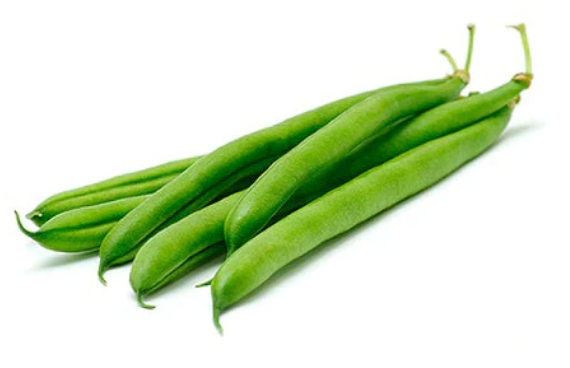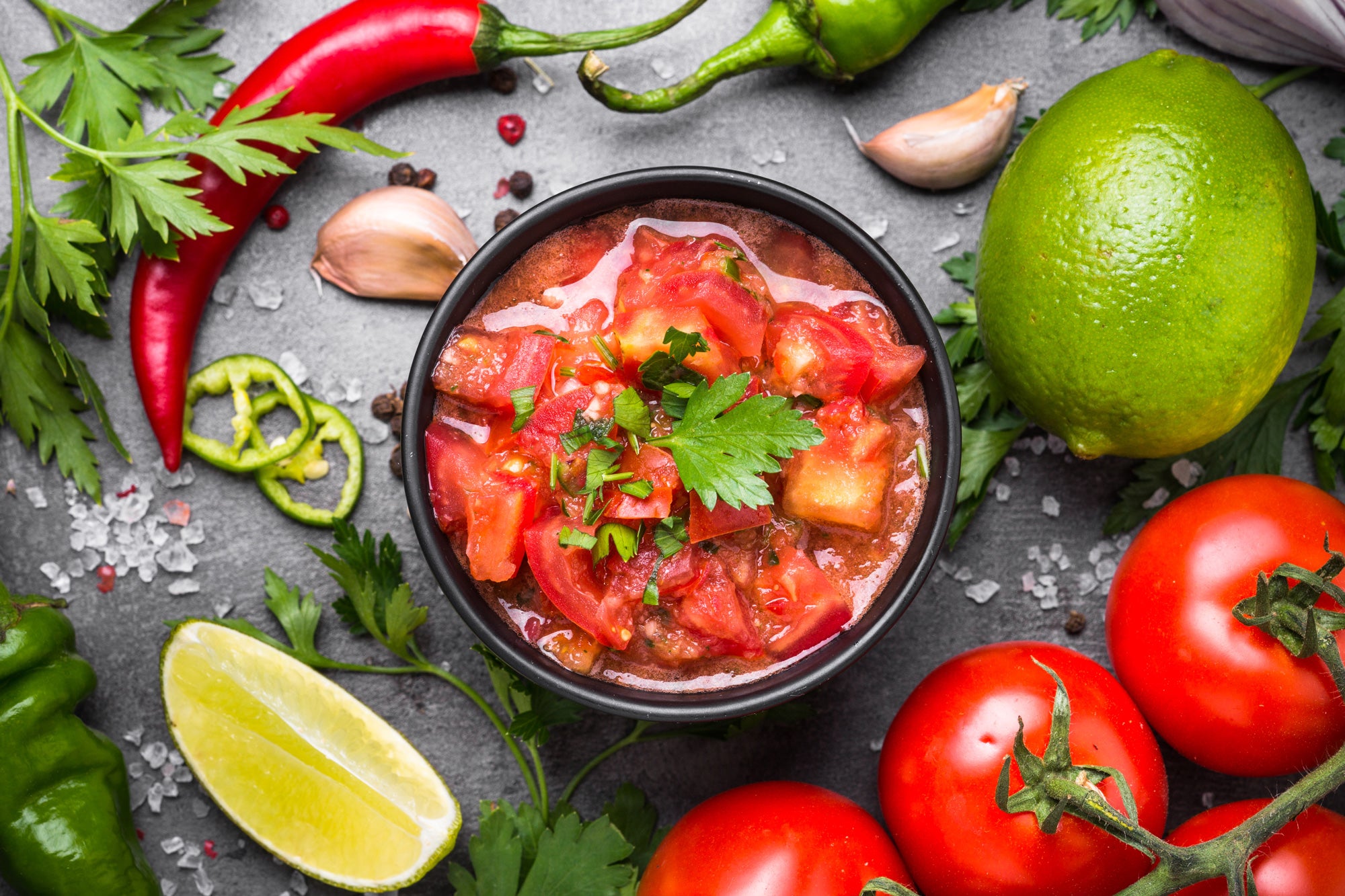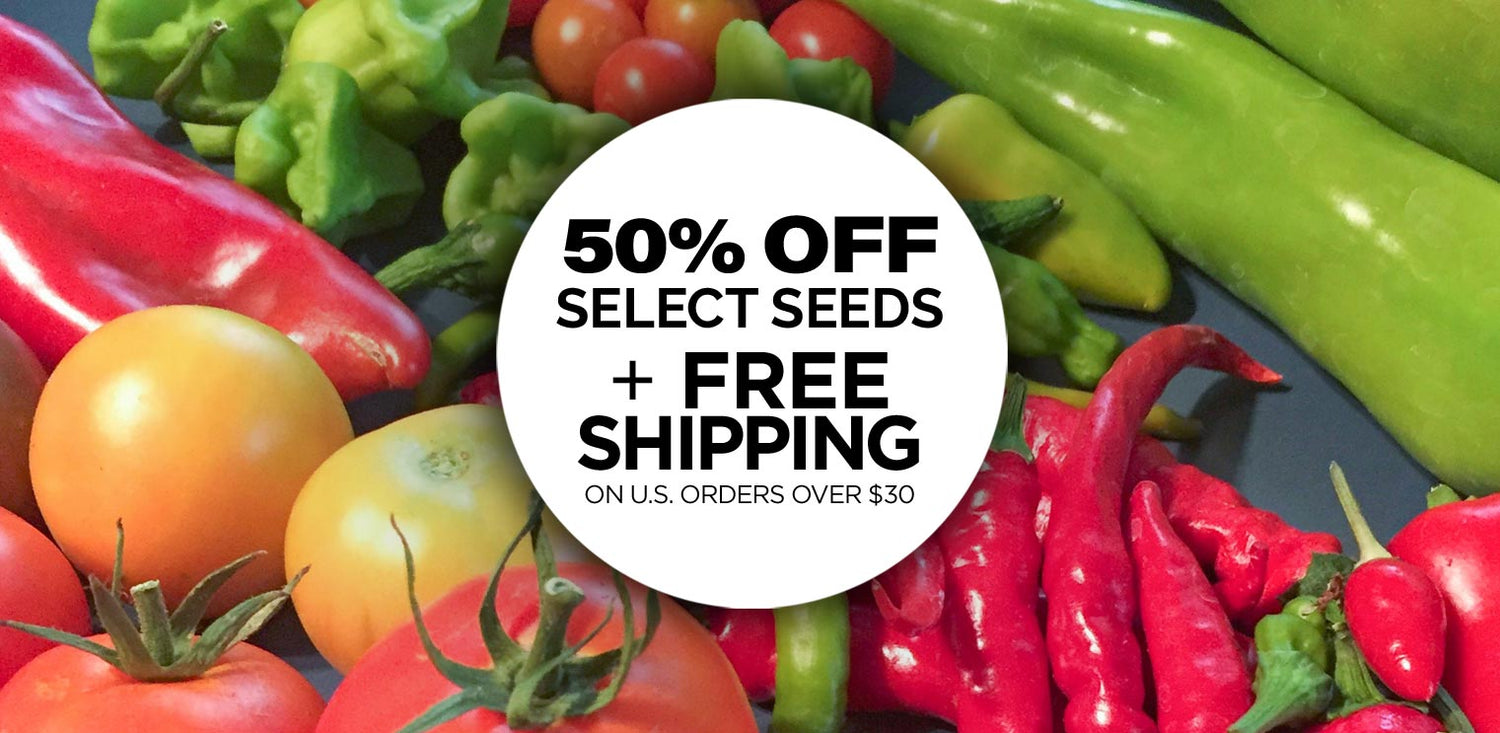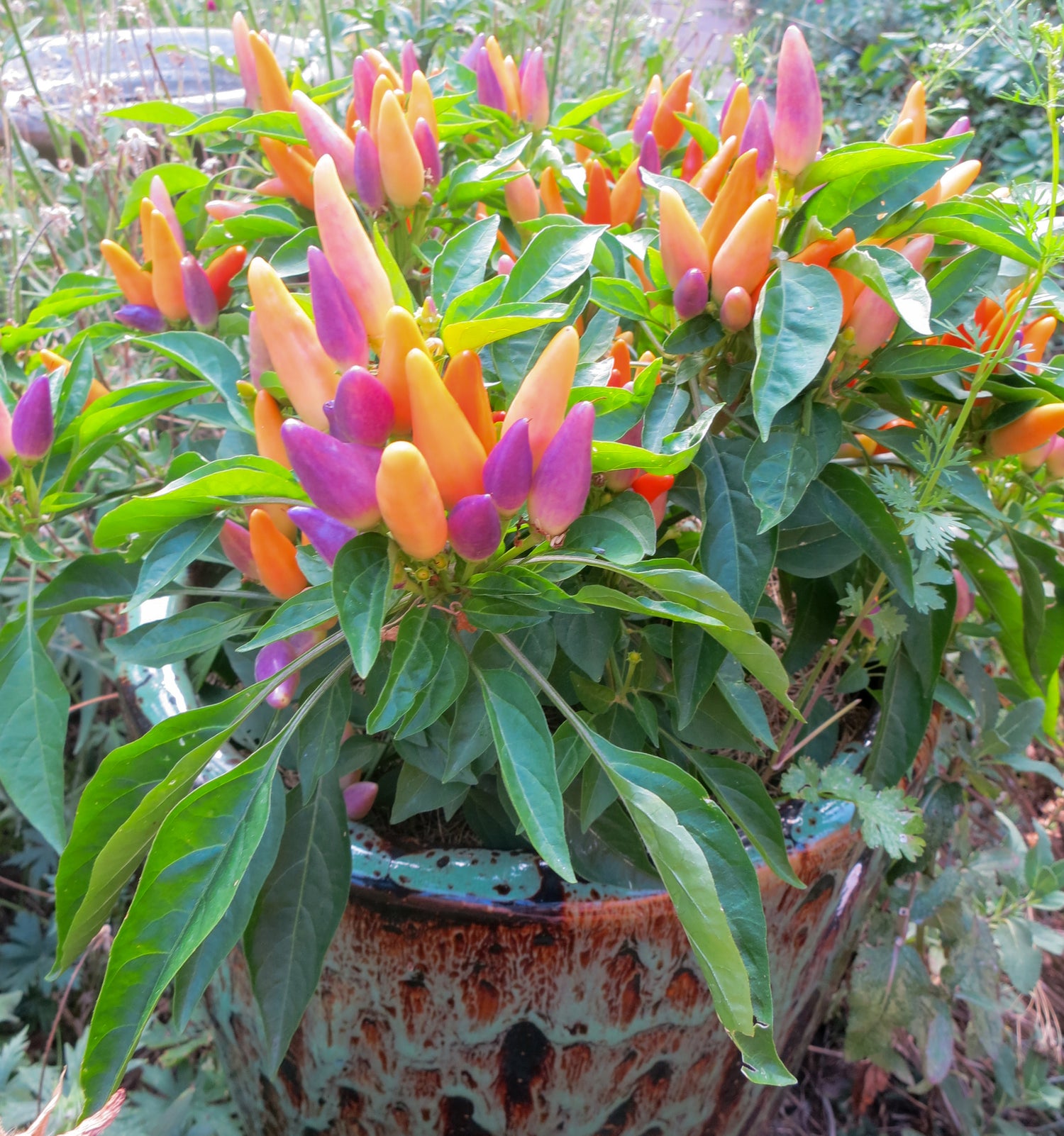
Wondering what to plant with your chile peppers to help them thrive?
Flowers, chives, carrots, radishes, squash, basil, parsley, dill, marjoram, Oregano, Rosemary, cucumbers, eggplant, and onions all do well when grown in close proximity to peppers. But don't plant them too close that they will shade your pepper plants: Squash and cucumbers, for example, need ample space so we plant them at least 3-4' away from our pepper patch. You can also use trellises for your cucumbers to grow them up off the ground, just make sure to place them so they don't shade your peppers for a bulk of the day.
Attracting beneficial insects to your vegetable garden »
OUR TOP 20 LIST
of the
BEST PEPPER PLANT COMPANIONS:

1. Flowers
Native plants are particularly helpful, so contact your native plant society in your city or state to find out what flowering plants are native to your region. Native plants are easy to grow as they thrive in each area's natural conditions without extra fertilizers or water – plus the birds, butterflies, and bees thrive on native flowers! Some of our favorite native flowers for our area in the west include Goldenrods, Coneflowers and Wild Geraniums. But it varies depending on where you are, so connect with your local native plant society to find out the best plants for your region. Read more about growing your own Homegrown National Park »
Good flowers to grow around your vegetable garden include:
Marigolds, Nasturtiums, Goldenrod, Black-Eyed Susans, Coneflowers / Echinacea, Penstemons, Alliums, and Geraniums (Geraniums are known to repel Japanese Beetles!)
Of course, with any flowers or plants, make sure not to plant them so close to your peppers that these flowers shade your peppers, as peppers like sun! If you have them growing nearby, that will be enough.
Attracting Beneficial Insects:
Flowers like Lavender, Nasturtiums, and herbs like Cilantro, Oregano, Basil, Sunflowers, Echinacea or Nasturtiums are great for attracting pollinators and beneficial insects when they are in bloom. Native plants especially attract beneficial insects like Lacewigs, Ladybugs, and Hoverflies, resulting in their incredible pest-eating larvae that devour aphids, caterpillars and other pests of your vegetables. Ask your local native plant society about what plants are best for your area.
Learn more about Plants that Attract Beneficial Insects

We like to keep a patch of Nasturtium growing (it reseeds every year if you leave the large seedpods). It's great as the leaves and flowers are edible, it self-sows, and it looks beautiful in the vegetable garden. The bees love Nasturtium, too!

This slightly over-planted pepper garden (yes, we do it, too!) still provides an abundant harvest. Note the Nasturtium growing in the top of the photo.

2. Basil
Basil is a wonderful herb for using in all sorts of recipes, and some people say that it boosts peppers flavor if grown nearby, and it also repels pests such as aphids and spider mites. It's beautiful too, and the pollinators love the blooms! We usually let a few basil plants bloom for the pollinators, and trim and harvest our other basil plants to keep them growing vegetation. Basil is super easy to grow from seed!

3. Cilantro / Coriander
Cilantro is amazing herb that is great to grow around pepper plants. Cilantro blooms attracts beneficial insects to gardens and the plant discourages pests such as aphids. Planting cilantro in the shade of pepper plants helps cilantro grow into a lush and bushy plant. Plus, enjoy the blooms when it bolts and flowers, which is inevitable – even the so-called "slow bolting" cilantro varieties will bloom, it really likes to become a flower. But don't worry, cilantro flowers smell wonderful, look dainty and lacy, and attract pollinators and other beneficial insects. If you let the flowers ripen and go to seed, you can save the dried brown cilantro seeds, also known as coriander for use in the kitchen and for resowing. Since Cilantro is short-lived, and it does like to bloom in the heat, we like to sow cilantro seeds every 2-4 weeks for a never-ending source of cilantro leaves for your salsas and recipes.

The entire cilantro plant is edible, including the roots, stems, leaves, flowers and seeds. Direct seed into your garden or large pots or containers for best results – gently press the seeds into the soil and cover with about ¼ inch of soil. Keep watered, cilantro likes consistent moisture, but not soggy soil!

4. Chives
5. Beans!
Beans are one of our all time favorite pepper companion plants. Short growing beans such as Bush Green Beans are great to plant around your peppers, as they fix nitrogen in the soil which helps improve natural soil fertility. Plus you get green beans!
Bush beans planted among your peppers can also help prevent sun scald on the fruits. This is because they can provide side shade for your pepper plants and keep the soil cooler which provides protection from excessive heat or sun.

6. Carrots

7. Onions

8. Lettuce

9. Spinach

10. Beets

11. Dill
Did you know that Dill makes a great Trap Crop for Tomato Hornworms?
Hornworm moths prefer dill over the tomatoes so having lots of dill growing in your garden will keep these pests away from your precious tomato plants. Did you know that hornworms turn into sphinx or hawk moths, also known as hummingbird moths? Yes, those ones that zoom around the garden at dusk and they look like hummingbirds. :) We love them. Plus, our dill is so prolific and self-seeds so much that we really don't mind if these guys munch on it. As long as they don't attack our tomatoes! Dill also attracts ladybugs, and Black Swallowtail butterflies love laying their eggs on it. So if you enjoy these amazing creatures in your garden, invite them to visit with dill! Dill also attracts hover flies, predatory wasps, and other beneficial insects, so we highly recommend growing it!
12. Garlic

13. Squash
Fun side note: Squash is great to shade bare soil, and cut down on weeds in the garden. Squash like pumpkins summer squash, or spaghetti squash are often planted with Corn or Sunflowers and Pole Beans for a Three Sisters Garden.
14. Oregano
15. Parsley

16. Coneflowers / Echinacea:

17. Cucumbers
18. Eggplant

19. Thyme
20. Rosemary Deters Aphids
Want to deter aphids? Plant some rosemary throughout the garden, African and French marigolds work well too. A group of French researchers designed an experiment that tested how effective 12 different companion plants were at deterring aphids from infesting a garden. The researchers set up two rows of pepper plants inside 13 individual growing chambers (there were 12 companion plants treatments and one control treatment with no companion plant), and then placed adult female aphids on each plant. Then, the various companion plants were set in between the two rows of pepper plants and allowed to grow alongside each other. Each day, the scientists would count the number of adult females remaining on the pepper plants, and also the number of neonate nymphs (baby aphids) that were produced by the adult female.
During the 12 day experiment, the scientists found that the aphids were more likely to flee from the pepper plants that were near companion plants. The control pepper plants did not lose any aphids, as the bugs were happy in their companion-plant-free environment. They also found that rosemary, lavender, geranium, African marigold, and French marigold significantly decreased the numbers of aphids being reproduced on the pepper leaves. In the end, rosemary outperformed the other companion plants in both deterring aphids, and lowering their reproduction numbers. The scientists attribute this effect to the VOC, or volatile organic compounds, produced by the plants. The VOCs signal to the aphids that the vegetation in a certain area near companion plants is not suitable for rearing young, so encourages the bugs to search on for more reproduction friendly fields.
It looks like a flat of rosemary will be on the planting list for this spring.
Sourced from: www.composttealab.com/research--development-blog/companion-plants-deter-aphids

Native Shrubs & Trees for Bees:

Leave the Leaves!
Note: we do usually clear out vegetable plant leaves and stalks at the end of the season, leaving the root balls to decay in the soil. If there is any powdery mildew or other diseases or pests, it is wise to remove the problem plants entirely from the garden.
PLANTS TO AVOID PLANTING WITH PEPPERS:
Avoid planting Peppers with Strawberries because they are prolific growers and can take over a pepper garden. Strawberries are also prone to some of the same diseases and pests as peppers so it's best to keep them separated.

Use Companion Plants to grow more Peppers
Growing companion plants with Chile Peppers ensures a great harvest! The more different types of plants and flowers you have growing in and around your vegetable and pepper garden, the better your garden will be! While peppers can self-pollinate with wind, having bumblebees, honeybees and other native pollinators give them an extra "buzz" boosts the likelihood of pollination.

Have you heard of Hatch Chiles?
Get some Hatch Green Chile seeds
and grow some New Mexico to your garden.
All of the above companion plants will help your green chiles thrive!
Peppers are easy to grow from seed!






















